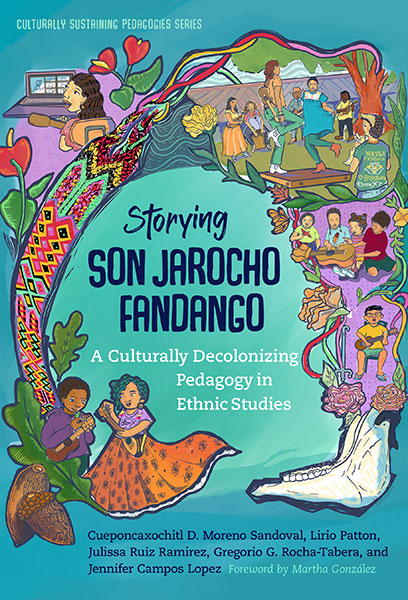Professors: Request an Exam Copy
Print copies available for US orders only. For orders outside the US, see our international distributors.
Cueponcaxochitl D. Moreno Sandoval, Lirio Patton, Julissa Ruiz Ramirez, Gregorio G. Rocha-Tabera, Jennifer Campos Lopez
Foreword by: Martha Gonzalez
Publication Date: July 26, 2024
Pages: 208
Series: Culturally Sustaining Pedagogies Series

"These narratives are in many ways medicine in these dire times in schools, in society, across the world." —From the series Foreword by Django Paris, coeditor of Culturally Sustaining Pedagogies
“A valuable teaching tool and an example of yet another set of voices and iterations of the effects of the son jarocho and fandango movement on communities.” — From the Foreword by Martha González, Scripps College
See what happens when Chicanx students’ educational experiences are shaped by the activation of ancestral worlds.
Born of songs like La Bamba, oral traditions, call-and-response practices, body as an instrument, and embodying ecologies, the authors posit son jarocho fandango (SJF) methodologies as a tool of convivencia/conviviality, communal healing, positive identity formation, and agency. Against the backdrop of white settler colonialism, members of the intergenerational Son Caracol Collective formed across two U.S.–Mexican border states and two ethnic studies university courses. The Collective follows the tradition of the SJF decolonial movement, positioning SJF as an ancestral elder of the African diasporic, Mexican Indigenous, Spanish, and Arabic traditions—whose threat of extinction sparked a cultural revitalization. The survival of SJF and its ancestral worlds supersedes the ruptures of colonialism. From ethnic studies classroom practices to organizing SJF in the community, this work highlights the possibilities of nurturing co-liberation.
Book Features:
Cueponcaxochitl D. Moreno Sandoval is an associate professor of Native American and Mexican Indigenous Studies at California State University, Stanislaus . Lirio Patton is a clinical assistant professor of teacher preparation at Arizona State University. Julissa Ruiz Ramirez, Gregorio G. Rocha-Tabera, and Jennifer Campos Lopez are scholars and members of the Son Caracol Collective, a group of intergenerational learners of the son jarocho fandango tradition.
“Many scholars have written about the son jarocho fandango practice, including myself, but I have yet to see another set of readings that captures the overall spirit and heart quite like this. And so kind reader, you hold in your hands a valuable teaching tool and an example of yet another set of voices and iterations of the effects of the son jarocho and fandango movement on communities.”
—From the Foreword by Martha González, associate professor, Intercollegiate Department of Chicanx-Latinx Studies, Scripps Humanities Institute Director, The Claremont Colleges
“Storying Son Jarocho Fandango is a beautiful and compelling text that draws from deep wells of Indigenous ancestral knowledge and wisdom. It is an inspired, multifaceted, and multivoiced account and pedagogy of cultural recovery and preservation that artfully—and indeed, successfully—resists imperialist, white individualist, neoliberal agendas that seek to erase community traditions and communitarian values both within and across borders. What better time than now to counter the so-called ‘culture wars’ than with the elegant, revitalizing, and grounding gift of Son Jarocho Fandango that derives from our Indigenous and Afro-Indigenous cultural heritage? This fills my heart with joy.”
—Angela Valenzuela, professor, College of Education, University of Texas at Austin
“A meaningful example of intergenerational knowledge sharing and community formation. This collective story, told through the voices of both teachers and students, offers a message of hope and a praxis for liberatory education through cultural resistance and preservation.”
—Michelle Téllez, associate professor, The University of Arizona
Contents
Foreword Martha González xiii
Series Foreword Django Paris xv
Preface Lirio Patton xix
With Deep Gratitude xxiii
Prólogo: El fandango jarocho como herramienta pedagógica xxvii
Por Gilberto Gutiérrez Silva y Gisela Farías Luna
1. Winding Into the Fandango Vortex 1
Envisioning Son Caracol 2
Note to the Reader 7
Culturally Decolonizing Pedagogy 7
Organization of the Book 13
2. Grounding an Understanding of Son Jarocho Fandango Pedagogy 15
Theoretically Grounding Application of Son Jarocho Fandango as a Culturally Decolonizing Pedagogy 16
Experiencing SJF’s Ontological Structures 28
Son Caracol Taking Root 33
Student Body at Cucunuchi University, a Brief Overview 36
Ethnic Studies Son Jarocho Fandango Students—Blossoms 38
3. A Call-and-Response Approach to Activating Ancestral Worlds in the Classroom 39
Introducing ETHS 4975 Afro-Mexican Indigenous Cultural Practice, Fall 2019 and Spring 2020 44
Circling Up With Students as Knowledge Keepers and (Emerging) Experts 47
Entering the Portal of Son Jarocho Fandango Ecologies and Possibilities 47
Collective Agency Toward Co-Liberation 76
Son Caracol Community Agreements 77
La Peña Cultural Center (2019) 79
Annual Indigenous Peoples Day Event—Indigenous Students in Activism (ISA) 80
Lessons On Institutionalizing Son Jarocho FandangoPractice at a Public University 84
4. Student-Led Co-Liberation Qualities of the Son Jarocho Fandango Movement 87
Student-Led Fandanguitos 88
Communities Engaged in Son Jarocho Fandango as a Decolonial Praxis 116
5. Trans-Bordering, Transgressive, Transformative Aspirations 119
Overview 119
Conclusion: Winding Down the Written Fandango 132
Appendix A: Son Jarocho Instruments 137
Appendix B: Methodological Notes: Son Jarocho Fandango as Method 139
Appendix C: Maestra Angela Flores on Teaching Son Jarocho: Honoring and Creating Relationships With Indigenous Musicians of Son Jarocho 147
Angela Flores
Appendix D: Son Caracol Members’ Connection to SJF and This Project 151
Appendix E: Key and Recurring Terms 153
References 155
Index 165
About the Authors 171
Professors: Request an Exam Copy
Print copies available for US orders only. For orders outside the US, see our international distributors.